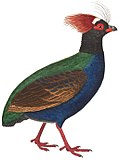
The black-faced antthrush is a species of passerine bird in the family Formicariidae. It is found in Central America from Honduras through Panama, on Trinidad, and in every mainland South American country except Argentina, Chile, Paraguay, and Uruguay.

The cocoa woodcreeper is a species of bird in the subfamily Dendrocolaptinae of the ovenbird family Furnariidae. It is found in Colombia, Costa Rica, Guatemala, Honduras, Nicaragua, Panama, Trinidad and Tobago, and Venezuela.
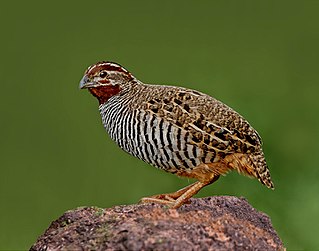
The jungle bush quail is a species of quail in the family Phasianidae. It is native to the Indian subcontinent, where it is found in peninsular India and Sri Lanka. It has also been reported from Nepal but has not been seen there since the 19th century, and an introduced population exists on the island of Réunion. A small species of quail 15–18 cm (5.9–7.1 in) long and weighing 57–82 g (2.0–2.9 oz), it shows significant sexual dimorphism. Males have brown upperparts with blackish and buff marking and whitish underparts with black barring. The face is mainly dark reddish-brown, with brown ear-coverts, a buffy-white moustachial stripe, and the supercilium turning whitish towards the back of the neck. Females have a similar pattern, but with pinkish-brown underparts, more uniform wings, and duller moustachial stripes.

The chestnut-backed antbird is a passerine bird in subfamily Thamnophilinae of family Thamnophilidae, the "typical antbirds". It is found in Colombia, Costa Rica, Ecuador, Honduras, Nicaragua, and Panama.

The ocellated quail is a species of bird in the family Odontophoridae, the New World quail. It is found in El Salvador, Guatemala, Honduras, Mexico, and Nicaragua.

The singing quail is a species of bird in the family Odontophoridae, the New World quail. It is found in Belize, El Salvador, Guatemala, Honduras, and Mexico.

The black-fronted wood quail is a bird species in the family Odontophoridae, the New World quail. It is found in Colombia and Venezuela.

The white-faced quail-dove is a species of bird in the family Columbidae. It is found in El Salvador, Guatemala, Honduras, Mexico, and Nicaragua.
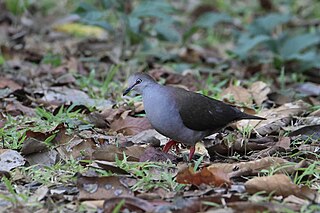
The grey-chested dove is a species of bird in the family Columbidae. It is found in Belize, Colombia, Costa Rica, Guatemala, Honduras, Mexico, Nicaragua, and Panama.
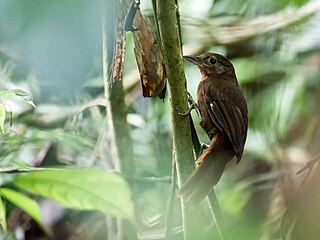
The ruddy foliage-gleaner is a species of bird in the Furnariinae subfamily of the ovenbird family Furnariidae. Its range is highly disjunct, with populations in Mexico, several Central American countries, and in every mainland South American country except Argentina, Chile, Paraguay, and Uruguay.

The rufous-breasted antthrush is a species of bird in the family Formicariidae. It is found in Colombia, Costa Rica, Ecuador, Panama, Peru, and Venezuela.
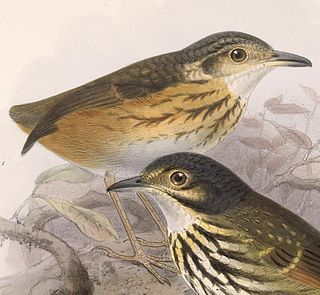
The thicket antpitta is a species of bird in the family Grallariidae. It is found in Colombia, Costa Rica, Honduras, Nicaragua, and Panama.

The tawny-breasted myiobius or tawny-breasted flycatcher is a species of passerine bird in the family Tityridae. It is found in Bolivia, Colombia, Ecuador, Panama, Peru, and Venezuela. Its natural habitat is subtropical or tropical moist montane forests.
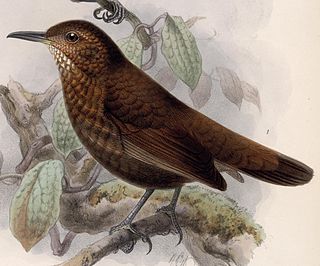
The scaly-throated leaftosser is a species of bird in subfamily Sclerurinae, the leaftossers and miners, of the ovenbird family Furnariidae. It is found in Mexico, every Central American country except El Salvador, and in Colombia and Ecuador.

The tawny-throated leaftosser is a tropical American bird species in subfamily Sclerurinae, the leaftossers and miners, of the ovenbird family Furnariidae. It is also known as the Middle American leaftosser and less frequently as tawny-throated leafscraper, Mexican leaftosser or Mexican leafscraper. It is found from Mexico to Panama.

The black-throated wren is a species of bird in the family Troglodytidae. It is found in Costa Rica, Nicaragua, and Panama.

The spot-breasted wren is a species of bird in the family Troglodytidae. It is found in Belize, Costa Rica, El Salvador, Guatemala, Honduras, Mexico, and Nicaragua.

The black-striped woodcreeper is a species of bird in the subfamily Dendrocolaptinae of the ovenbird family Furnariidae. It is found in Colombia, Costa Rica, Ecuador, Nicaragua, and Panama.
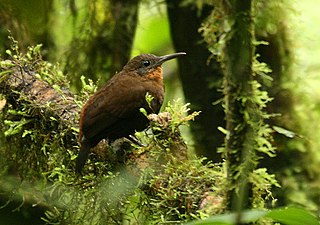
The dusky leaftosser or South American leaftosser is a bird in subfamily Sclerurinae, the leaftossers and miners, of the ovenbird family Furnariidae. It is found in Bolivia, Brazil, Colombia, Ecuador, French Giana, Guyana, Panama, Peru, Suriname, and Venezuela.

The fawn-throated foliage-gleaner is a species of bird in the Furnariinae subfamily of the ovenbird family Furnariidae. It is found in Belize, Costa Rica, Guatemala, Honduras, Mexico, Nicaragua, and Panama.


























